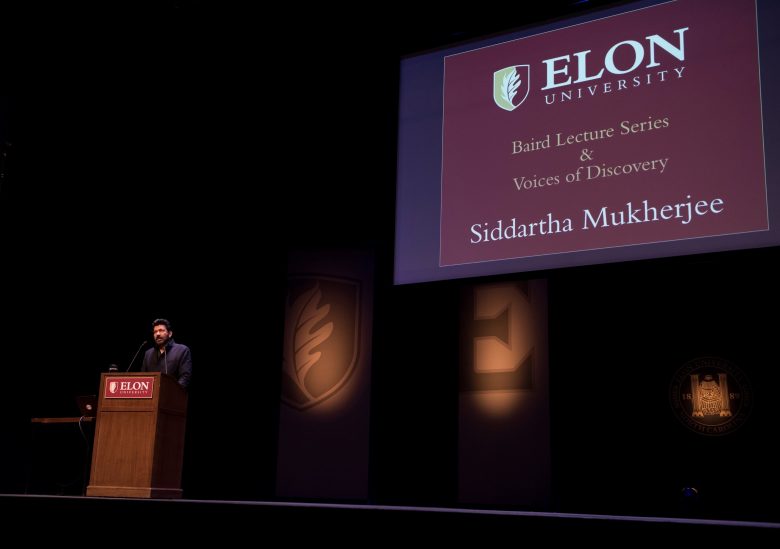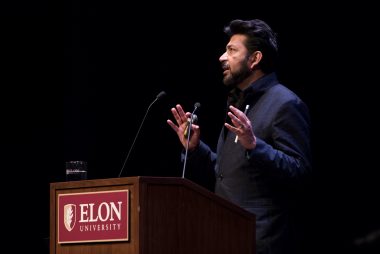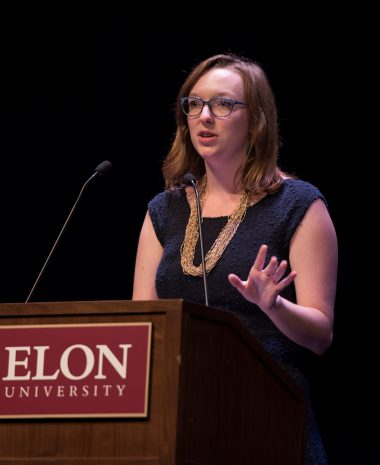Dr. Siddhartha Mukherjee, the author of "The Emperor of All Maladies: A Biography of Cancer," offered his insights to a crowd of nearly 600 gathered in McCrary Theatre on Sept. 20.
 Dr. Siddhartha Mukherjee looked out at a crowd of nearly 600 and noted that there were few gathered there Thursday night inside McCrary Theatre who have not been impacted by cancer. They’ve either faced a diagnosis themselves or had the pervasive disease affect their loved ones, family, friends and co-workers, Mukherjee said during this year’s Baird Lecture Series presentation.
Dr. Siddhartha Mukherjee looked out at a crowd of nearly 600 and noted that there were few gathered there Thursday night inside McCrary Theatre who have not been impacted by cancer. They’ve either faced a diagnosis themselves or had the pervasive disease affect their loved ones, family, friends and co-workers, Mukherjee said during this year’s Baird Lecture Series presentation.
And given the strides that cancer research and treatment are making, the number of people who face such a diagnosis and survive over the long term will continue to rise, said Mukherjee, a renowned oncologist and author whose book, “The Emperor of All Maladies: A Biography of Cancer,” received the Pulitzer Prize in 2011.
“It’s something that affects all of us,” said Mukherjee, an assistant professor of medicine at Columbia University and a cancer physician at New York-Presbyterian Hospital/Columbia University Medical Center. “We need to make enormous strides in the future against cancer.”
 A Rhodes Scholar who graduated from Stanford University, the University of Oxford and Harvard Medical School, Mukherjee has developed a well-earned reputation for being able to “bridge the gap between science and society,” Mary Alice Allnutt ’18 said during her introduction of Mukherjee. He followed the success of his deep dive into his award-winning history of cancer research and treatment with his 2016 work, “The Gene: An Intimate History,” that explored the evolution of the scientific study of the gene.
A Rhodes Scholar who graduated from Stanford University, the University of Oxford and Harvard Medical School, Mukherjee has developed a well-earned reputation for being able to “bridge the gap between science and society,” Mary Alice Allnutt ’18 said during her introduction of Mukherjee. He followed the success of his deep dive into his award-winning history of cancer research and treatment with his 2016 work, “The Gene: An Intimate History,” that explored the evolution of the scientific study of the gene.
During his hour-long talk, which was also part of the Voices of Discovery speaker series, Mukherjee walked the attendees through the history of cancer research and treatment, beginning in the 1800s when cancer was identified as a disease of excess cell division. But that first discovery quickly led to the question of what was driving typically normal cells to begin dividing abnormally. The body is made up of trillions of cells, and when a person dies of cancer, it’s the result of mutations in just a single cell that has taken over and spread throughout the body, Mukherjee said.
“Why would a perfectly good citizen cell wake up one morning and decide to start dividing?” Mukherjee said. “What made that cell become abnormal is an idea that would ring through the history of cancer.”
Unlike other diseases, “every individual specimen of cancer is its own individual specimen of cancer,” Mukherjee said. “We have not encountered in our history a disease where every single instance of the disease is its own instance of the disease. That is a unique thing about cancer.”
In the 1950s, cancer research and treatment was essentially “throwing hammers at the machine” of cancer and “every once in a while, we could stop this malignant machine from working.” That progressed in the following decades to “using screwdrivers and wrenches to stop individual cogs and wheels” inside the cancer machine, Mukherjee said.

Cancer treatment has now shifted to looking at the environment around the “cancer machine” itself to identify ways to use a person’s immune system to change the physiology of cancer cells externally. “It boggles the mind to think about the kinds of technology we’re using,” Mukherjee said.
What he called “The Grand Experiment” is to now use a combination of strategies and technologies to effectively conquer cancer going forward. It’s a mix of reducing the likelihood of developing cancer in the first place, such a the use of highly targeted anti-inflammatory chemicals, along with early detection, personalized treatments and targeted therapies, he said.
“We have to do better not only at identifying these cancers but also in identifying those that are likely to act badly, that are likely to metastasize, so that you can act early,” Mukherjee said. “It’s going to be a strange thing in the world because as more and more people survive cancer, the relative prevalence of people who have had a diagnosis of cancer in the world will rise. The more successful cancer therapy is, the more prevalent cancer survivors are in the world.”
During his visit, Mukherjee was hosted by Vickie Moore, associate professor of chemistry who conducts cancer research, and had dinner with Elon students who discussed with him their interests in research and medicine. Becky Neiduski, the dean of the School of Health Sciences, began the evening lecture with a welcome to the crowd and by introducing Allnutt.
The Baird Pulitzer Prize Lecture Series was made possible in 2001 through an endowed gift from James H. and the late Jane M. Baird of Burlington, N.C., who were the first presidents of the Elon Parents Council. The Voices of Discovery speaker series brings to campus preeminent scientists and mathematicians who have left an indelible mark on the way we view the world.


